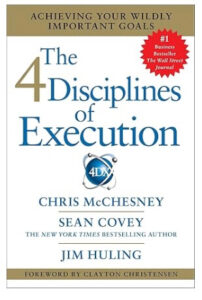Last Updated on October 15, 2025 by Dave Schoenbeck
Every year, businesses set ambitious goals, including new revenue targets, marketing initiatives, and product lines, among others. Yet by the end of the first quarter, most progress towards these goals has stalled. In The Four Disciplines of Execution, authors Sean Covey, Chris McChesney, and Jim Huling discuss this “execution gap,” and more importantly, how to overcome it.
Why Most Organizations Fail at Execution
The truth is that most organizations consistently fail to turn strategy into results, but the culprit behind this failed execution isn’t a lack of effort. Instead, it’s what Covey et al. refer to in The Four Disciplines of Execution as “the whirlwind.” This includes the daily operational tasks that consume time and energy, such as responding to emails, resolving issues, and attending meetings.
It’s one thing to know that, however, and another thing to overcome it. After all, these daily tasks do need to get done. Enter the 4DX strategy. Drawing from years of consulting work with thousands of organizations, Covey, McChesney, and Huling present a framework for achieving organizational goals that bridges the divide between knowing what to do and actually doing it.
The 4 Disciplines of Execution Overview
The Four Disciplines of Execution, or 4DX, states that execution is not about having more knowledge or better strategies—it’s about creating focus, measuring what matters, making progress visible, and establishing consistent accountability.
So, what are the four disciplines of execution? In order, they are as follows:
- Focus on the Wildly Important Goals
- Act on the Lead Measures
- Keep a Compelling Scoreboard
- Create a Cadence of Accountability
The 4DX methodology states that when organizations implement these four disciplines with rigor, they can achieve breakthrough results even while managing their operational whirlwind.
Discipline 1: Focus on the Wildly Important Goals (WIGs)
The first discipline mentioned in The Four Disciplines of Execution requires prioritization. Instead of pursuing ten goals at once, businesses must identify one or two “wildly important goals,” or WIGs. Your 4DX goals should follow the SMART goal format: specific, measurable, achievable, relevant, and time-bound, following the format “from X to Y by (when).”
Effective WIGs have a significant impact—they’re not simply modest improvements, but breakthrough achievements that can fundamentally change the trajectory of your organization.
Discipline 2: Act on the Lead Measures
Most people naturally focus on lag measures: metrics such as revenue, profit margins, or customer satisfaction scores. While these outcomes matter, they reflect the results of past actions you can no longer influence. By the time you’re able to measure them, it’s too late to change anything about them.
Lead measures, by contrast, are current behaviors you can directly control that will predict future results. They answer the question: “What actions, done consistently, will drive the lag measure?” For example, a lead measure in sales might be the number of follow-up calls made to potential clients.
The key is identifying lead measures that are both predictive of success and actionable by your team. When people track these activities religiously, they can see the direct connection between their daily actions and their ultimate goal.
Discipline 3: Keep a Compelling Scoreboard
In The Four Disciplines of Execution, Covey et al. note that people behave differently when they’re keeping score. A compelling visual scoreboard in an accessible location makes your WIG progress immediately apparent to everyone on the team.
Unlike complex executive dashboards, player scoreboards should be simple enough that anyone can glance at them and instantly know whether they’re winning or losing. These scoreboards must display both the goal itself and the measures driving it, updated regularly.
The scoreboard transforms abstract goals into a competition. Teams should design their own scoreboards to maximize engagement and ownership.
Discipline 4: Create a Cadence of Accountability
The fourth discipline is where execution either lives or dies. It involves holding brief weekly WIG sessions where team members report on their current commitments, review the scoreboard, and set new objectives for the coming week.
These meetings follow a strict rhythm: What did I commit to last week? Did I accomplish it? What will I commit to this week? How does the scoreboard look? Leaders must model this discipline themselves, attending every meeting and reporting on their own commitments first.
The power lies in peer accountability, as no one wants to report failure to their colleagues every week. When team members commit to specific actions in front of their peers, follow-through increases dramatically.
Key Takeaways from the 4 Disciplines of Execution
The Four Disciplines of Execution fundamentally reframes how organizations approach achieving their goals. Execution isn’t about working harder or having better plans; it’s about creating clarity around what matters most, measuring the right metrics, making progress visible, and establishing accountability.
The 4DX strategy works because it acknowledges reality: the whirlwind will never disappear, but you can still achieve results while navigating the day-to-day chaos. By narrowing your focus, taking control of controllable measures, keeping track of progress, and meeting regularly to commit and report, teams can change their behavior and deliver results that previously seemed impossible.
I read this book years ago, and I adapted my coaching process to mirror their recommendations. I learned that the Trello app is the perfect way to organize the whirlwinds and track their projects and initiatives. Prioritization is the key. Couple this approach with Brian Tracey’s ideas, and you have a powerful way to significantly improve your personal productivity. This is how I run my coaching practice and my personal life.
Feeling motivated by The Four Disciplines of Execution? Click here and sign up for my weekly articles to learn more about the keys to entrepreneurial success. If you need a business coach to help you achieve your goals, click here to schedule a meeting.
Coach Dave
- The Cheat Code for How to Build an Effective Winning Team - December 11, 2025
- A Practical Guide on How to Create a Business Strategy That Works - December 4, 2025
- Entrepreneur Anxiety is a Disturbed Relationship with Certainty - November 28, 2025


